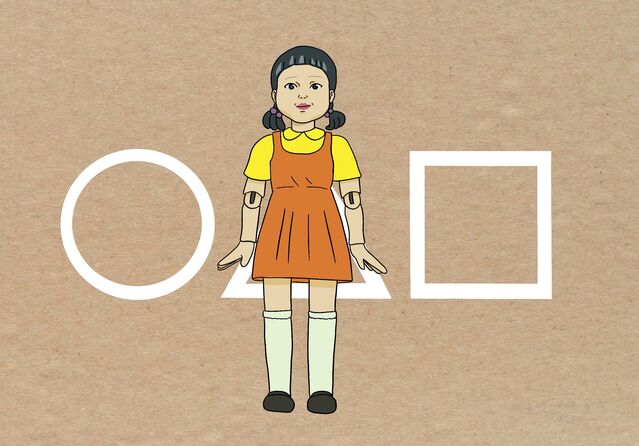Suicide
How South Korean Society (Unfortunately) Inspired Squid Game
How growing economic inequality inspired the season's hottest series.
Posted October 19, 2021 Reviewed by Abigail Fagan
Key points
- “Squid Game” has become the most-watched series in Netflix's history.
- The series reflects the intense pressure to achieve success and respectability in South Korea, which starts in early childhood.
- South Korean society doesn't represent a true meritocracy, and “Squid Game” reflects the problems that arise in an unfair system.

Unless you've been living under a rock, you may have heard of Squid Game. This fictional South Korean Netflix series features desperate individuals competing in a series of murderous children's games for a chance to win $38 million. The series captured viewers' imaginations around the world, becoming the most-watched series in Netflix's history.
But why does the show focus on children's games? Within the context of the story, the six children's games (red light/green light, dalgona, tug-of-war, marbles collecting, stepping stones, and the titular squid game) featured are included by the game master, as they were a key part of his boyhood. Aesthetically, the childish innocence of the games and the candy-colored background clash starkly against the cruel choices and brutal deaths of each round. And based on my own experience growing up in South Korea, I wonder whether the puerility of the murder games serves to provide a grim reminder of how the rat race of white-collar respectability in South Korea starts in early childhood.
An excellent elementary school performance enables entry into a top middle school, increasing the chance of being admitted into an elite high school. Success in an elite high school increases the likelihood of admissions in the three most prestigious universities in South Korea: Seoul National University, Korea University, and Yonsei University. These universities (loftily referred to as "S.K.Y.”) feed their graduates into top-tier firms and companies, leading to higher salaries and improved marital prospects.
However, what may superficially seem like a meritocracy on paper is anything but. Every step can be made more accessible with money, including cram schools, private tutoring, and foreign trips for cultural and language education. And at the end of the day, there can only be so many winners.
Considering this pressure cooker culture, it's no wonder that the suicide rate in South Korea is catastrophic. Within the 38 member countries that represent the Organisation for Economic Co-operation and Development, South Korea's suicide rate was the highest, with 24 deaths by suicide per 100,000 deaths. In comparison, the United States suicide rate was 14.5 deaths by suicide per 100,000 deaths.
Squid Game creator, writer, and director Hwang Dong-hyuk (himself a S.K.Y. graduate) is no stranger to advocating for the weak by using his films to stir up public emotion and discussion. His second feature film, Silenced, was based on a real-life story at a school for the deaf in which students were physically and sexually abused. At the time, he commented, "I took up filmmaking because I was so frustrated by all these unresolved social issues I saw. We can see through films how much we are changed by the world. You can't change society with just one movie, but looking at the repercussion of the release of this film, we can think about the power film has in terms of positively affecting society."
Squid Game was born out of a similar impetus. Hwang told IndieWire that the initial conception of the show occurred during the 2008 financial crisis. He noted that the difference between the "winners" and "losers" in the decade that followed became more pronounced. "There was the cryptocurrency boom, where people around the world, especially young people in Korea, would go all in and invest all their money into cryptocurrencies. And there was the rise of I.T. giants like Facebook, Google, and in Korea, there's Naver, and they are just restructuring our lives. It's innovative, but these I.T. giants also got very rich."
With each passing year since the financial crisis, the premise of Hwang's show, in which desperate contestants wager their lives for a chance to dig themselves out of a financial rut while the ultrarich looks on with indifference, seems less and less ludicrous.
The explosive popularity even prompted the North Korean media outlet Arirang Meari to criticize the show and its neighbor to the south, stating, "The show demonstrates the sad reality of the beastly South Korean society in which human beings are driven into extreme competition and their humanity is wiped out."
While it's amusing to hear North Korea comment on human brutality and miss (or ignore) the show's satirical bent, the writer seems to get at the underlying premise of the problems that arise in an inherently unfair system.
The show is so compelling because it presents the viewers with the victims of a society where the poor get poorer, and the wealthy get wealthier. And ultra-violent murder games aside, it shows us a world that seems too familiar for comfort, in Korea and elsewhere.
If you or someone you love is contemplating suicide, seek help immediately. For help 24/7 contact the National Suicide Prevention Lifeline, 1-800-273-TALK, or the Crisis Text Line by texting TALK to 741741. To find a therapist near you, see the Psychology Today Therapy Directory.
References
“‘the Crucible’ Brings Demons of Child Molestation Case back to Life.” n.d. Accessed October 18, 2021. http://english.chosun.com/site/data/html_dir/2011/09/28/2011092801311.h….
Hersko, Tyler. 2021. “‘Squid Game’ Director on the Show’s Massive Global Success, Its Themes, and a Potential Sequel.” IndieWire. October 10, 2021. https://www.indiewire.com/2021/10/squid-game-director-season-2-hwang-do….
“남조선사회의 실상을 폭로하는 TV극 《오징어게임》 인기.” n.d. Accessed October 18, 2021. http://www.arirangmeari.com/index.php?t=news&no=17808.


